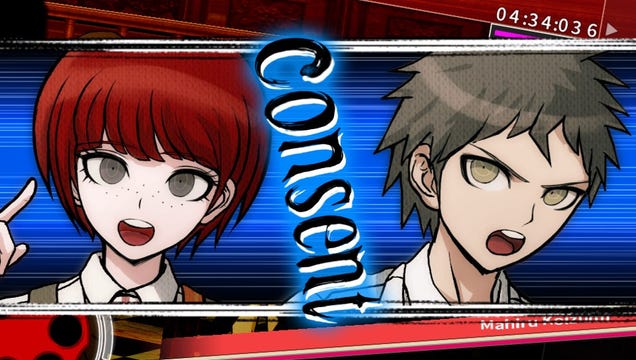I have a question for everyone in regards to their experience with both games.
When you are playing are playing though the game as Hajime or Makoto do you tend to think of it like you are the character? What I mean is that in games with blank slate protagonists (Persona, Pokemon, etc) you tend to associate the character as yourself since you control them and it's easy to place yourself in their mind. With characters like Hajime or Makoto do you get that same feeling? Like when someone insults them do you react like "Oh they just insulted me" or do you think of them more as just another character in the game rather than "your" character.
This is probably going to be a long reply, since other thoughts popped up that relate to what I'll see here, like "Chiaki shouldn't have led on the player so much in trial 5" and "I don't like how different chapter 5 felt."
First, when I play a game like this that has a main character you control, but they're actually their own character, I liken my role as the player to a voice in the characters head. For the most part, I'm along for the ride and seeing events unfold as they do(with some minor exceptions, aka seeing things that character doesn't), and only am there to put them on a path to a good/right end with my own choices. I find this especially true in DR, where no matter what the overall thought is of the other characters, if you run out of health, you're always the one to be found guilty. This idea heavily plays into a lot of things of Case 5.
Second, I want to state what I think Nagito was going for, as it's not as simple necessarily as the game has you believe. Personally, I felt that not only was he trying to kill all of the cast, who he then knows as the Ultimate Despairs, but also to make sure the "traitor", who he knows is part of the Future Foundation, to survive. To him, once he found out about everyone else, the FF became a very different group in his eyes, likely soldiers of Hope. He would NEVER kill someone in that vein, so he sets up a scenario where they'd become the blackened without them necessarily knowing it, so when the rest either choose that Nagito is the blackened due to suicide, or they probably pick at random if they discover the poison the traitor would survive. It's not only a supposedly unsolvable scenario, but also one where the blackened shouldn't feel guilty for becoming so, Nagito took that all upon himself. To that end, the only way he knew this would be possible was to rely again on his Ultimate talent. It's one of the reasons why I really liked the character, as he's one of the only ones in any of the games to actually use their Ultimate ability to any real effect in the actual narrative(also seen with the insane russian roulette part).
Now, we go into Case 5, where we have to guide the cast out and survive, because that's our role. So the case largely plays like it's supposed to, with fostering the "I got it!" feeling that's in every other case of both games up to this point. This even continues once we find out Nagito killed himself. However, we then figure out(likely at a similar time that Chiaki herself discovers) that Nagito actually used someone else to actually do the deed(this is likely what all of the other wounds and stuff was meant to do, draw people away from this fact to further protect the blackened), and this is where this one case in the series changes drastically. It no longer fosters the "I got it!" feeling that usually makes the player feel good about what their doing, but then moves into the one case in the series, surprisingly enough, that actually fills the player with despair. At this point, you're seeing an accident that's about to happen, like two trains on the same track barreling towards each other, but you are completely powerless to stop it. Chiaki realizes it, and cheerily helps you on(hell, she's actually the only one smiling in any of the cases when you shuffle through people to pick as the culprit). It feels bad man, and it's supposed to. Of course, the game is smart enough to know that if the player knew what Nagito knew at this point(about them being Ultimate Despairs), it's hard to imagine any player not wanting to sacrifice the rest of the cast to save Chiaki, so that's why the events happen in the order they do. It makes that revelation in Case 6 hurt all the more...
Of course, Nagito being who is he is, probably figures it's possible for this outcome as well(as nothing is impossible for a soldier of Hope!), so that's why you have existence of the second message. If anything, maybe this much despair could turn into so much Hope that even the Ultimate Despairs could be changed for the better. Ironically, this really does make him also the hero of the game as who knows how case 6 would have went if not for this.







